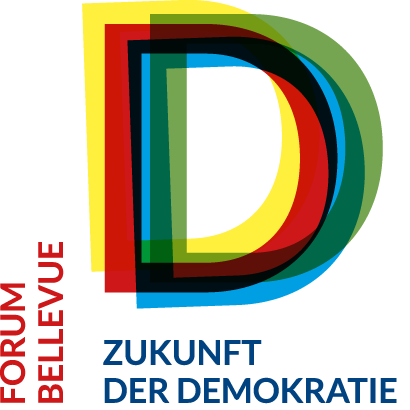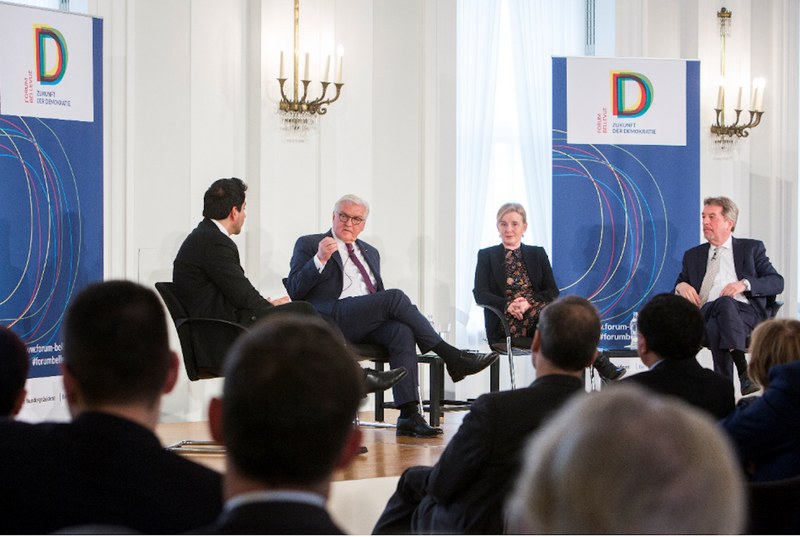"Is Everything a Matter of Faith? On the Relationship between Religion and Democracy"
26 February 2019
Are religion, politics and democracy suited for each other? How can lived faith and political community coexist? And how can a new religious diversity develop in harmony with the liberal-democratic constitutional order? German Federal President Frank-Walter Steinmeier discussed these questions with guests from the worlds of academia, politics and media, as well as from a number of religious communities, at the "Forum Bellevue on the Future of Democracy".
Federal President Steinmeier (following Faust's Gretchen) posed the crucial question at the beginning of the event: "Tell me, how do you feel about religion?" The question was also a reference to the diversity of different convictions, faiths and value systems in today's Germany. Everyone in Germany must be free to answer this question in a positive or in a negative way, the Federal President said. For this sixth edition of the "Forum Bellevue", Germany's Federal President had invited participants to engage in an exceptionally complex, but also urgent and highly charged debate. "Just a matter of faith? On the relationship between religion and faith" was the theme of the event. Joining Germany's Federal President on the stage were Evelyn Finger, head of weekly magazine Die Zeit's "Faith & Doubt" department, and two academics, Hans Joas, a sociologist, and Ernst Troeltsch, Professor for the Sociology of Religion at the Humboldt University of Berlin, and Mouhanad Khorchide, an Islamic studies scholar and head of the Münster Center for Islamic Theology.
Religion gaining in importance
How can religion and democracy successfully and respectfully coexist? Panelists and guests in the audience returned repeatedly to this question. The conversation also addressed the degree to which religious communities want and can engage in reform. At this point, journalist Evelyn Finger described how difficult it is to offer factually based criticism without this being equated with a more fundamental criticism of religion itself, or even being taken as hostility to religion per se. Hans Joas added that churches have to go through their own learning processes, and that they should eschew the "self-sacralization" that prevails among some institutions.
Joas emphasized that religions did not develop rigidly and solely out of themselves, but rather arose "in perpetual interaction with the moral ideas of the people who belonged to the religion." To illustrate this, the sociologist referred to the development of slavery, which is deeply contrary to the principle of universal human rights and the concept of human dignity and has today been rightly outlawed worldwide. Yet he noted that in past times, Christian communities delivered justifications for the practice, even if they now seem absurd from today's perspective.
Questions regarding reform and adaptation also extended beyond the Christian churches. The discussion of reforms in Islam and a historical-critical treatment of the Koran also sparked controversy. Khorchide emphasized that depending on the theological interpretation, the understanding of Islam can lie between obedience to a demanding, punitive God, and trust in a creative, loving God of mercy. The latter is his own interpretation, he noted. This offers a variety of approaches to reform, and is compatible with democracy, he said.
The discussion then turned to the concrete example of child marriage, a practice that violates fundamental rights, and the importance of the role of theology in contextualizing passages from the Koran that are relevant to this topic.
Religious conflicts: Only a question of organization?
How can religion be lived within a liberal democratic order, and how should believers organize themselves? In this context, the conversation turned to the still-unresolved question of how Islam can be organized in Germany, along with its integration under the laws dealing with religion. The low degree of organization of Muslim followers in Germany, at least in comparison with the traditional Christian churches, sometimes makes it difficult to create platforms for dialogue, and sometimes leads to incomprehension on the part of the state, Khorchide said. The Islamic studies scholar pointed out that Islam does not have a central organization, and that the Islamic umbrella organizations represent only a minority of Muslims. In this context, he called for better integration of Muslim communities into Germany's political and societal institutions.
The debate on religion and democracy must continue
At the end of a long debate, in which the audience's questions and contributions played a key role, it became clear that all wanted to continue this conversation. Federal President Steinmeier, too, observed that the complex relationship between religion and politics could not be fully discussed at one single event. However, the conversation offered inspiration for further examination of the relationship between religion and democracy, and for further discussion of these tensions, he said.
The "Forum Bellevue on the Future of Democracy" is a series of events initiated by the German Federal President and held in cooperation with the Bertelsmann Stiftung. In the course of the Forum Bellevue series, Federal President Frank-Walter Steinmeier meets regularly with guests from the worlds of academia, politics, culture, business and civil society to discuss the challenges facing our democracy. The Forum is intended to provide an opportunity for the exploration of controversial issues and new ways of looking at things. Dialogue on the challenges facing liberal democracy and the factors contributing to democracy's success is conducted in an open atmosphere.
The speech of the Federal President for the event can be downloaded here. (pdf).

